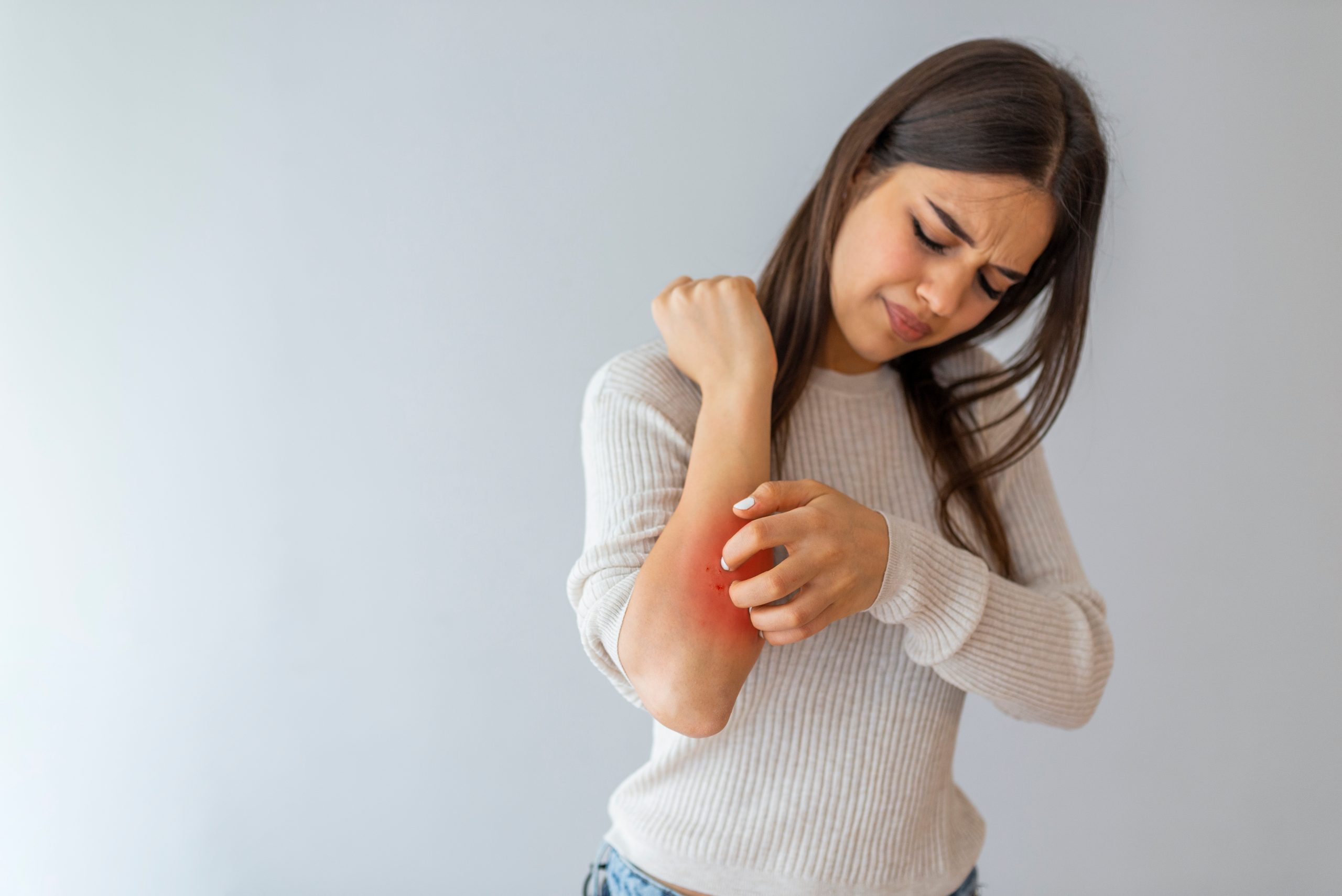Conditions
Dermatitis Treatments at Dermatology Associates of Plymouth Meeting
When skin becomes irritated, itchy and flaky, you can usually chalk it up to dermatitis. Dermatology Associates of Plymouth Meeting can diagnose and treat all types of dermatitis with oral and topical medications, light therapies and lifestyle recommendations.

What Is Dermatitis?
Dermatitis is the umbrella term for conditions that inflame and irritate the skin. You might experience red, itchy skin for any number of reasons, including genetics, immune system activity, allergic responses, infections and so on.
Types of Dermatitis
Because dermatitis symptoms can occur for so many reasons, the condition can be broken into several categories that describe its cause(s), granular symptoms, location and other details. These different types of dermatitis include:
- Atopic dermatitis (eczema) – a chronic skin condition that makes skin dry and scaly, and can flare up at intervals
- Contact dermatitis – a reaction (allergic or irritant-based) from touching a substance that makes the skin red and itchy at the points of contact
- Diaper dermatitis (rash) – a common issue for infants that irritates the skin in the diaper region, often caused by moisture and bacteria
- Dyshidrotic dermatitis – a chronic skin condition with unknown origins creating tiny blisters and dry, itchy skin, often on the fingers, hands and feet
- Neurodermatitis – a skin condition of unknown origin that causes on-and-off itchiness and sometimes pain anywhere on the body
- Nummular dermatitis (nummular/discoid eczema) – a chronic skin condition that flares up in the form of round, red patches that are often itchy and crusty
- Perioral/Periorificial dermatitis – a type of dermatitis that occurs around the mouth in the form of dry, flaky red bumps (papules) that resemble acne and may burn
- Seborrheic dermatitis (dandruff, cradle cap) – a common skin condition that occurs on the scalp and causes dry and itchy patches on areas of the scalp (may occur elsewhere on the body, too)
- Stasis dermatitis – a form of eczema that arises from poor blood flow
What Causes Dermatitis?
The causes of dermatitis are varied and sometimes difficult to pin down. The most common factors that appear to trigger dermatitis symptoms relate to:
- Immune System
- Genetics
- Environment
- Exposure
Let our dermatologists identify your dermatitis causes and offer treatment.
Dermatitis Symptoms
- Itching
- Dry skin
- Red rashes and bumps
- Rashes that look and/or feel like a burn
- Fluid-filled blisters
- Thickening, hardening and swelling skin
- Crusting, scaling and creasing skin
- Painful ulcers
- Rashes that ooze fluid or bleed when scratched
What Does Dermatitis Look Like?
Dermatitis can appear differently based on its type, cause and location. In most cases, dermatitis will show up as red, flaky, dry and/or crusting or blistering patches of skin.
Is Dermatitis Contagious?
No type of dermatitis is contagious – this means you can’t catch it from or give it to anyone else, even in the event of close skin-to-skin contact. That said, those with family members who have dermatitis may be more likely to develop it due to genetics.
Diagnosing Dermatitis
Dermatitis is often easy to see at a glance, but dermatologists deploy multiple methods to confirm the exact type of dermatitis and nail down its root cause. These methods include blood tests, skin biopsies and allergy skin tests. Your doctor will also ask you a series of questions related to your habits and condition.
How To Treat Dermatitis
While dermatitis can’t be cured, the condition is often easily treatable and managed. Many flare-ups will disappear on their own. To reduce symptoms more quickly, dermatologists may recommend one or more of the following treatments or lifestyle adjustments:
- Ultraviolet (UV-A or UV-B) light
- Bleach baths
- Wet wrap therapy
- Regular moisturizer use (especially after showers and baths)
- Body temperature regulation (avoid high heat and humidity)
- Limit your number of showers and baths (one per day, lukewarm water)
- Use mild, unscented soap
- Shield your skin from irritants
- Decrease stress levels
- Don’t scratch, pick at or rub skin
- Calcineurin inhibitors (topical medications that lower inflammation)
- Corticosteroid creams and ointments
- Phosphodiesterase-4 inhibitors (also helps with inflammation)
- Biologic injections (blocks functions of the immune system that affect dermatitis)
- Oral medications that reduce immune responses affecting dermatitis
- Antihistamines (sometimes used for contact dermatitis)
- Antibiotics (used to fight infection, often for those with perioral dermatitis)
Can Dermatitis Be Cancerous?
As irritating and sometimes painful as dermatitis can be, this condition doesn’t pose any significant health threat in its own right. However, recent studies suggest a potential link between atopic dermatitis and the risk of developing skin cancer. While this relationship requires further study, it’s always a good idea to receive regular skin cancer screenings from a trusted dermatologist, regardless of your struggles with dermatitis (or lack thereof).
If you’re looking for a solution to your dermatitis dilemma, see a dermatologist at Dermatology Associates of Plymouth Meeting. Call us at 610-828-0400 to set an appointment.
